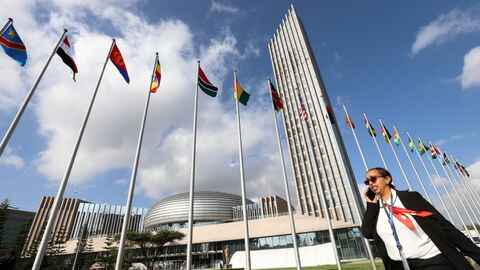To demand compensation, the AU teamed up with CARICOM, the Caribbean community, in 2023. Among other things, CARICOM’s own reparations plan calls for investments and technology transfers to address illiteracy and health concerns.
Former colonial countries, the majority of which have rejected making apologies for past wrongs, are likely to thwart African leaders’ efforts to start a fresh campaign for slavery and colonial reparations when they meet in Ethiopia this weekend.
The opposition has increased along with the global momentum behind the reparations issue. Many European governments have opposed even discussing reparations, and US President Donald Trump has stated that he “does not see it (reparations) happening”.
Leaders of the African Union intend to develop a “unified vision” of reparations during the Addis Ababa summit, which could include anything from monetary compensation and official admission of historical wrongs to policy changes.
The AU’s economic, social, and cultural council, or ECOSOCC, said on X that “Reparations is the hot topic in Addis Ababa”.
At least 12.5 million Africans were abducted, forcefully transported, and sold into slavery by primarily European traders between the 15th and 19th centuries.
According to ECOSOCC, which has been advising member states on the subject, the reparations discussion must cover the effects of colonialism and slavery to this day, ranging from racism to the economic gaps between affluent Western countries and Africa.
“It is getting harder to ignore the harm that slavery and colonialism have caused”, said Alfred Mavedzenge, a Zimbabwean attorney and reparations specialist.
The burdensome debt that African countries incurred after gaining independence is the root cause of the continent’s debt dilemma. Colonialism is also connected to the climate crisis: Africa’s delicate ecosystems have been hardest hit by global warming, despite the continent contributing only a small portion of carbon emissions.
“Much more than recompense”
Financial payments have dominated most of the reparations debate, especially in former colonial powers like Portugal and Britain, but proponents argue that there are other ways to make up for the past.
“Reparations are more than just compensation”, stated William Carew, the head of the secretariat for ECOSOCC.
“It is about . . . ensuring future generations inherit a world that acknowledges their past and propels them towards a brighter future”.
In a statement, the AU stated that reparations for Africa might include returning cultural artifacts and restitution of land in nations where indigenous communities had lost their land.
It also emphasized how international organizations like the UN must hold former colonial nations accountable and modify policies that support inequality.
“This might involve diplomatic pressure or legal actions at international courts”, added the AU.






